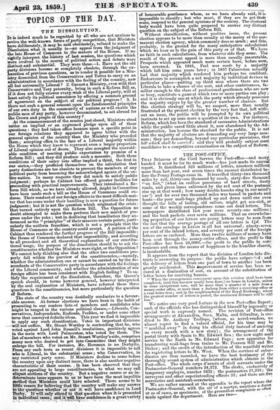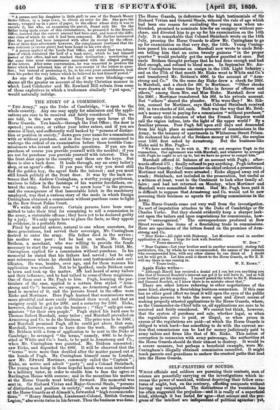THE POST-OFFICE.
THAT Briareus of the Civil Service the Post-office—and. many handed it must be for its much work—has just made its annual report. It distributed 523 millions of letters, nineteen millions more than last year, and seven times the amount distributed be- fore the Penny Postage came in. It travelled thirty-two thousand miles by rail, thirty-one thousand by coach, sixty-five thousand "on foot," (what an endless panorama of hard streets, dusty roads, and green lanes enlivened by the red. coat of the postman' rise up at that word ; how many double knocks ring in our mind's
i ear !) and for over two thousand miles was tossed in packets and boats—the poor mail-bags pitched up and down until one even thought the bills of lading, old sailors, might get sea-sick, or some of the weekly correspondence come out dead letters. The, newspapers distributed last year were seventy-one millions ; and the book packets over seven millions. That an overwhelm- ing proportion of our letters are penny letters may be seen from the fact that the average postage of all our letters is led. The use of the envelope in letters is all but universal; ninety-seven per cent of the inland letters, and seventy per cent of the foreign letters are so enclosed. More than twelve millions of money have been sent through the money-order offices, and the profit to the Post-office has been 25,000e—the profit to the public in con- venience and even the means of happiness to the humbler classes, is incalculable.
It appears from the report that the division of London into dis- tricts is answering its purpose : the public have cooperated : and the delivery of letters from one part of town to another has been greatly accelerated. This improvement of service has been se- cured at a diminution of cost, on account of the substitution of letter boxes for receiving houses.
" When the arrangements consequent upon this revision shall have been completed, (and this has now nearly been done,) no house in London, unless in some exceptional case, will be more than a quarter of a mile from a money-order office, or more than a furlong from either a receiving-office or a road letter-box ; and in the neighbourhood of the Royal Exchange, where the greatest number of letters is posted, the maximum distance will be still
less.'
We notice one very good feature in the new Post-office Report; each of the officials who has distinguished himself by ingenuity or special work is expressly named. The revision of Post-office arrangements at Alexandria, Suez, Malta, and Gibraltar, is cre- dited to Mr. Anthony Trollope, (whom, as novel-readers, we almost regret to find a valued official, for his time may be " muddled. away" in doing his official duty instead of amusing us every month with a new story) ; the arrangement of the postal treaty with Spain to Mr. Edward Rea ; the new night mail service to the North to Mr. Edward Page ; new apparatus for transferring mail-bags from trains to Mr. Pearson Hill and Mr. Dicker ; and the credit of the introduction of the manifold writer for registering letters to Mr. West. When the services of subor- dinates are thus recorded, we have the best testimony of the thoroughly sound system of administration which obtains in the Post-office. The whole corps d'armee of civil servants under the Postmaster-General numbers 24,372. The clerks, exclusively of temporary employes, number 1632; the postmasters 11,236; the surveyors and other superintending officers 33; and there are five secretaries and assistant-secretaries. We are rather amused at the appendix to the report where the Postmaster-General, with the air of a martyr, mentions a doses or so of cases, as specimens, of the groundless complaints so often made against the department. Here are two-
"A person sent his daughter (a little girl) to one of the Branch Money Order Offices, in a large town, to obtain an order for 308. She gave the money, wrapped up in a piece of paper, to the officer whose duty it was to receive it, but who, on examinuag the parcel, found only 258 On the father being made aware of this circumstance, he proceeded to the Branch Office, insisted that the correct amount had been sent, and named the diffe- rent coins of which he said it had been composed. He further insinuated that the parcel had been tampered with after its receipt by the officer. Two or three days afterwards however, the complainant confessed that the sum deficient (a crown piece) had been found in his own shop."
" A person applied at the Leeds Post Office, and stated that two letters (one of which contained the half of a bank note), which he had himself posted at that office, had not reached their destination ; mentioning at the same time some circumstances associated with the alleged posting of the letters. After some conversation, he was requested to produce the letter which had informed him of the non-receipt of the letters in ques- tion ; but instead of producing it, he, to his own great astonishment, took from his pocket the very letters which he believed he had himself posted."
As one of the public, we feel as if we were blushing—our shame all the greater on account of the truly Christian manner in which Lord Colchester and Mr. Rowland Hill refrain from some of those expletives in which a tradesman similarly " put upon," would naturally indulge.



























 Previous page
Previous page